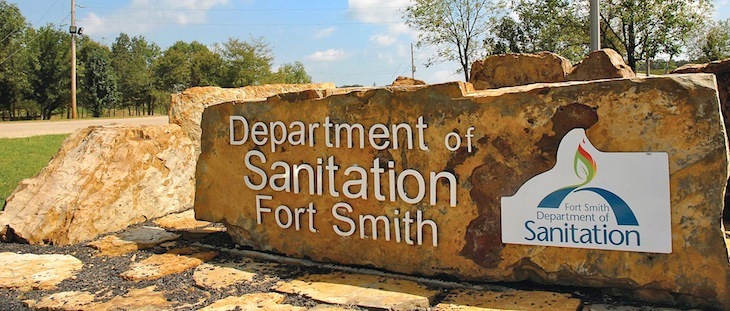Efforts begin to rebuild trust in Fort Smith with recycling program
by June 28, 2017 3:09 pm 658 views

The city of Fort Smith restored its recycling program on Monday (June 26), but the fight to rebuild trust with residents will be a challenge. Fort Smith Director Keith Lau told Talk Business & Politics on Tuesday (June 27) the city has “just got to get better at what we do.”
“We have to say, ‘From now on, when we have a problem, we’re going to disclose it to citizens because they’re smart enough and can handle the truth,’” Lau said, adding the situation is “just like something in your family.”
“If you had a family issue, you’d all talk about it and realize you’re all part of the same family and that you’re all going to be part of the same family as long as you live, or as long as you live here in Fort Smith, and that you need to work it out. We just need to rebuild credibility and start putting more political capital back into our account, and showing citizens we are managing wisely,” Lau said.
One way the city is already doing that, Lau added, is in the adoption of financial policies for city government as part of the consent agenda at the June 20 meeting.
“It didn’t get much attention, but that was huge — a balanced budget, reserve requirements. Those are things that make for smooth city governance. It passed with little fanfare, but I really do consider that the biggest piece of legislation I’ve been a part of since I’ve been on the Board.”
Lau said it’s also important for Fort Smith residents to realize recycling is part of an enterprise fund that operates with revenues generated from fees, which “we’re not going to raise” now that the program is restarting under coordination of the sanitation department, Third Rock Recycling, and its partner company Pen Sales.
Still, the doubts are there — a fact Lau acknowledged.
“People are unhappy when you don’t recycle, and then they’re unhappy when you do recycle, and they’re questioning the dollars and stuff and that’s par for the course, because we’ve broken their trust by not telling them we stopped.”
WHAT THE CITY IS DOING
Fort Smith Deputy City Administrator Jeff Dingman, discussing where the city goes from here in reselling the recycling program to residents, said the current focus “is to get the contract going, get it operating like it’s supposed to, and then start talking about what happens next.”
“We have some bridges to rebuild there, but the only way that we can do it is to perform the service, and so our intention is to perform the service as best we can. I think the community wants to recycle, and what we’ve heard the last month or so has reaffirmed that. And so, we want to show we have an outlet for that to happen and will continue to do so,” Dingman said.
Fort Smith City Administrator Carl Geffken said the city will work on public education about what is being done in an effort to restore faith in the program. In addition to including flyers inside of utility bills, “We’ve talked about using stickers and the recycling containers themselves as a reminder,” Geffken said, adding he plans to reach out “to several people, who have been very interested in the city’s recycling issues” for the “effort and love” they demonstrated for the practice over the last two months.
“I haven’t done that yet, but will hopefully get a chance to do it today,” Geffken said on Tuesday.
A PLAN OF ACTION
Chip Paris of Fort Smith-based marketing firm Paris Marketing & Public Relations affirmed much of Lau’s take, telling Talk Business & Politics every organization “makes mistakes that eat away at brand equity, or in this case, political capital,” but “reacting quickly and positively can do a lot of work at rebuilding.”
In a case like the city’s, Paris said, they should “go back to the drawing board and ask what precipitated the issue.”
“Create or adapt the system to make sure that communication issue doesn’t happen again,” Paris said. “Remember you’ve just eroded some of your most essential brand value — trust — so anything and everything you say in the future will be questioned until you build that back again. If you don’t have a clear plan for communicating, then create one.”
Paris recommended making an effort to get in front of customers, listen to what they have to say, and make sure everyone has an opportunity to be heard.
“Take it to heart, and make it part of your plan moving forward. It will also give you the chance to talk about how you’re addressing the issues.”
Paris continued: “Start internally, and get serious about helping your team, at every level, understand the strategy and vision and give them reasons to believe and facts that support. Then take that same approach externally. This goes for all issues; not just the one you just dealt with.”
Finally, the city must research and start using new channels for connection throughout the community.
“Again, make sure you have a clear communications plan or system in place. Deliver an honest, believable message. Keep the story uniform across all outlets,” Paris said.
